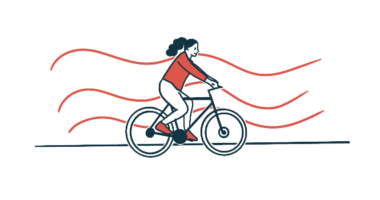Sandblasted at the Dentist for a New Parkinson’s Smile

My mom says, “You only get one set of teeth. Take care of them.” This is especially important with Parkinson’s disease. Regular dental visits are a vital part of your care plan.
However, it’s much easier said than done, especially when your dentist retires. After months of procrastinating, you’ll find a new dentist with a new office and a plethora of new equipment.
That was precisely my situation a few weeks ago. The first visit was doomed from the start, I thought. The initial consultation appointment was scheduled for two hours, making me hope my jaw wouldn’t take on a life of its own with uncontrollable tremors. Realizing my anxiety, the office manager accommodated me with an additional appointment a few days later, so the first visit would be shorter.
Appointment No. 1 was a series of history questions, X-rays, and pictures of all my teeth. We managed to keep my jaw under control, and the first consult appointment ended with the plan that I return a few weeks later.
Appointment No. 2 was a bit more intimidating. Anxiety, one of the invisible symptoms of Parkinson’s, presents challenges, especially with medical appointments. Add in the bonus of new people, equipment, and big-screen televisions, and anxiety can reach a new level. Mine was no exception.
Parkinson’s affects your ability to swallow as well as your facial muscles. Swallowing less frequently causes excess saliva that settles in parts of your mouth. The result is a buildup of both plaque and tartar, which is not a pretty picture. Literally.
Looking at the high-definition pictures of my teeth was a game-changer. While my plaque and tartar were normal, I never want to see them on television again. I cannot control many Parkinson’s symptoms, but I can control this one. I have become a dedicated flosser, and I use my Parkinson’s dominant hand with the little individual flossers.
Studies using the Oral Health Impact Profile (OHIP-14) have shown that good oral hygiene can improve your quality of life. If your dentist doesn’t use the questionnaire, fill one out online and bring the results to your next appointment. It may help your dentist help others.
By the end of the adventure, my teeth had a sandblasting treatment, and the dental hygienist took another picture. The before and after pictures were incredible. They inspired me to write this column and share a few tips on how to keep your teeth clean, while adding a little balance work and brain activity at the same time.
- Use both hands when you brush and floss your teeth.
- Get an electric toothbrush.
- Hum a tune. Try the ABCs.
- Stand on one leg while holding on to the counter or sink.
- Put the toothpaste on with your nondominant hand.
- Make faces that exercise your facial muscles.
Don’t forget the alcohol-free mouthwash and be sure to puff out those cheeks. Keep those facial muscles strong and show off that newly polished smile!
Note: Parkinson’s News Today is strictly a news and information website about the disease. It does not provide medical advice, diagnosis, or treatment. This content is not intended to be a substitute for professional medical advice, diagnosis, or treatment. Always seek the advice of your physician or another qualified health provider with any questions you may have regarding a medical condition. Never disregard professional medical advice or delay in seeking it because of something you have read on this website. The opinions expressed in this column are not those of Parkinson’s News Today or its parent company, BioNews, and are intended to spark discussion about issues pertaining to Parkinson’s disease.








Comments
Sheila
Hi Everyone
I have been reading all of your comments for a while now but this is my first post. My husband was diagnosed with Parkinson's 5 years ago but he probably had it at least 5 years before that. What I am interested in is whether anyone has suffered (or is suffering) what he calls a "hot head" - his face and head feel immensely hot to him although they do not look hot or feel hot to touch. Nonetheless, this is a very troubling symptom and no-one seems able to recognise it or treat it. The only thing that helps is for my husband to sit in an air-conditioned room with a fan blowing directly onto his head. He can no longer enjoy sitting out on a nice day without soon becoming plagued with the "hot head" nor can he enjoy a trip to the park with our very young grandson. He says it feels as if his head is pulsing. Can anybody please help? We need to get this under control if possible.
Lori DePorter
Hi-
You can try reaching out to others on our forums....here is a link to get you there....http://parkinsonsnewstoday.com/forums/
Another resource may be....https://www.michaeljfox.org/ask-md
Good Luck!
Sheila Fallows
Thank you. That's what I thought I had done. I'll try again.
Lori DePorter
http://parkinsonsnewstoday.com/forums/
If the link does not work....go to the top of the page and click on the "FORMUMS" tab...6th one over after "COLUMNS"